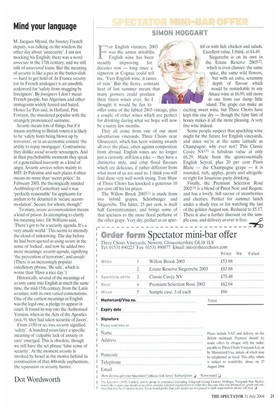Mind your language
M. Jacques Myard, the bouncy French deputy, was talking on the wireless the other day about 'unsecurity.. I am not mocking his English; there was a word unsecure in the 17th century, and we still talk of unsecured loans. But the meaning of security is like a pea in the butter-dish — hard to get hold of. In France security (or its French analogue) is an unsubtle codeword for 'safety from mugging by foreigners'. By foreigners [don't mean French people, but Algerians and other immigrants widely feared and hated. Hence Le Pen and, in Holland, Pim Fortuyn, the murdered populist with the strangely pronounced surname.
Security means lots of things, but if it means anything to British voters it is likely to be 'safety from being blown up by terrorists', or in an economic context 'the ability to repay mortgages'. Contrariwise they dislike social security scroungers. And in their psychobabble moments they speak of a generalised insecurity as a kind of angst. Security services refers mainly to MI5, In Palestine and such places it often means no more than 'secret police'. In February 2003, the theologically minded Archbishop of Canterbury said it was 'perfectly reasonable' for applicants for asylum to be detained in 'secure accommodation'. Secure for whom, though?
To many, secure accommodation means a kind of prison. In attempting to clarify his meaning later, Dr Williams said, 'There's got to be a security agenda. It's a very unsafe world.' This seems to intensify the cloud of unknowing. The day before he had been quoted as using secure in the sense of 'locked', and now he added two more meanings: security agenda, signifying 'the prevention of terrorism', and unsafe. (There is an increasingly popular valedictory phrase, 'Be safe', which is worse than 'Have a nice day.') Historically, several of the meanings of sectuity came into English at much the same time, the mid-15th century, from the Latin securitas, with its own varied connotations. One of the earliest meanings in English was the legal one, a pledge to appear in court. It found its way into the Authorised Version, when in the Acts of the Apostles (xvii, 9) 'they had taken securitie of Jason'.
From 1450 or so, too, security signified 'safety'. A hundred years later a specific meaning of 'culpable lack of anxiety or care' emerged. This is obsolete, though we still have the set phrase 'false sense of security'. At the moment security is invoked by Israel as the motive behind its construction of that 400-mile euphemism, the separation or security barrier.
Dot Wordsworth


























































 Previous page
Previous page